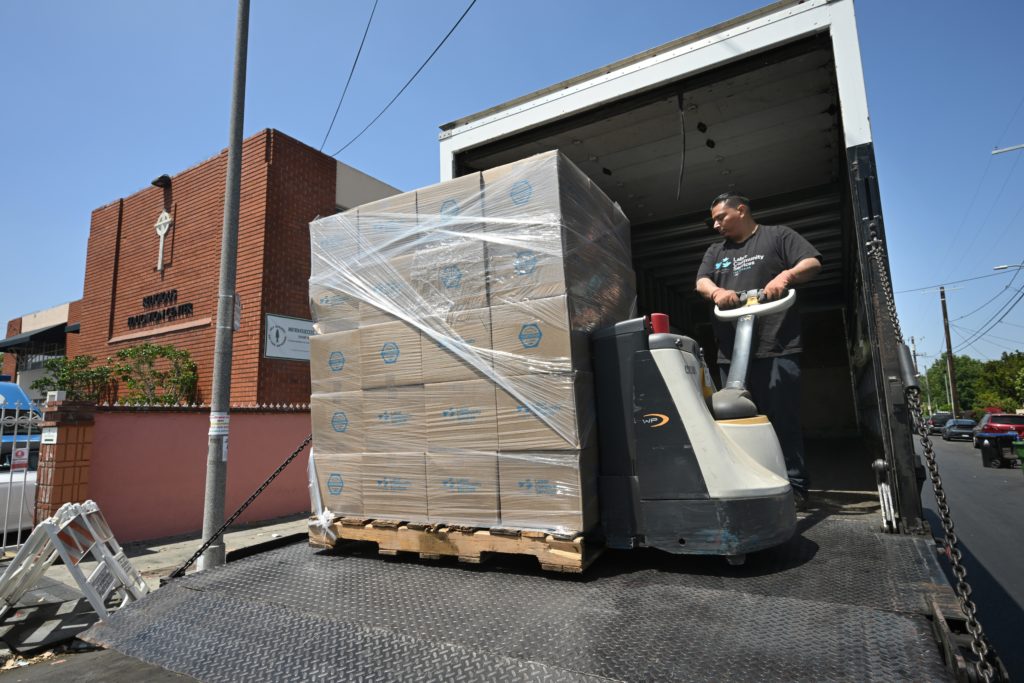There’s no getting around the word.
Fear.
In largely Latino communities across Southern California shaken by weeks of immigration enforcement raids on city sidewalks and local businesses, the fear has forced undocumented immigrants inside, shut out from work, from church, from life.
It’s not just them. Others are fearful that this is happening in their cities, to their loved ones, to their fellow parishioners, to their neighbors, to their employees, to their local businesses.
But all that fear has also been channeled into action, as Catholic parishes throughout the Archdiocese of Los Angeles have gotten creative in looking for ways to help hurting families.
At Presentation of Mary Church in South LA, a food bank for families affected by the raids grew with its youngest parishioners stepping in and raising awareness about it on social media.
At St. Raphael Church a few miles away, volunteers are taking food to people’s homes if they’re finding it difficult to leave.
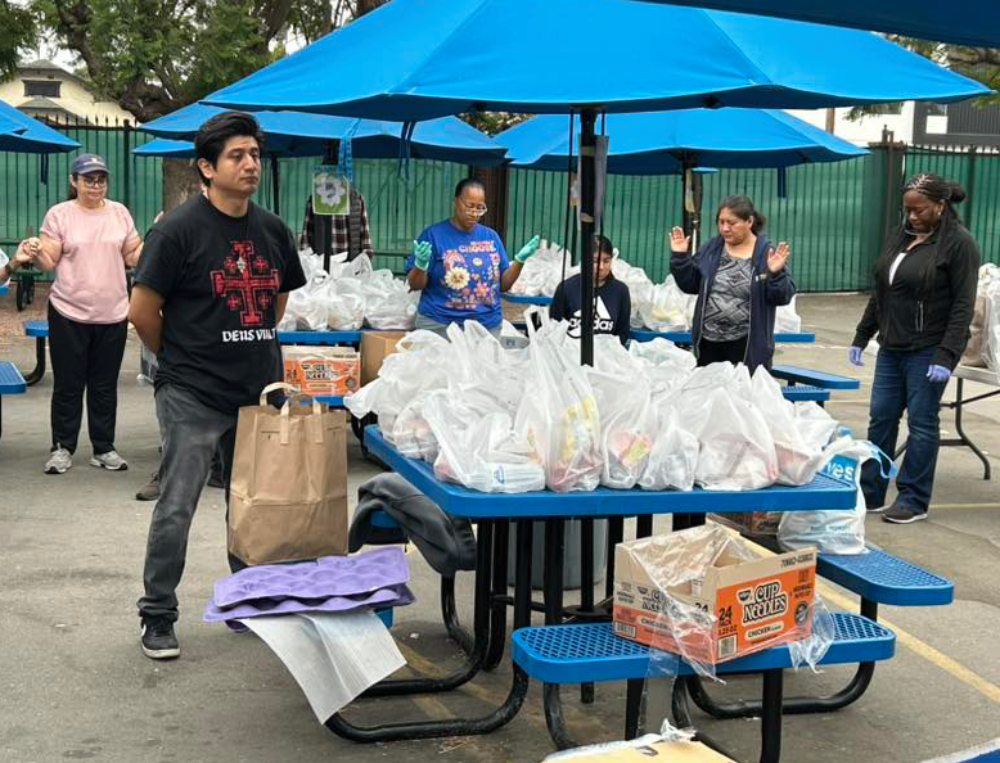
At St. Patrick Church, just south of downtown, pastor Msgr. Timothy Dyer received donations from more affluent parishes, including St. Monica Church in Santa Monica and Holy Family Church in South Pasadena, to help offset the decline in donations after Mass attendance dropped dramatically.
At Our Lady of Talpa Church in East LA, Father Miguel Angel Ruiz said some of his parishioners have picked up children of undocumented immigrants and taken them to Mass, often buying them an ice cream afterward to give them a slice of normalcy after being stuck indoors.
Several other parishes are doing similar things, but no matter the effort, it’s all about accompaniment, said Isaac Cuevas, the archdiocese’s director of immigration and public affairs.
“I’m incredibly proud that our city, our faithful are standing up for injustice,” he said. “It’s evident that people know that the need is there, and that the Church and Archbishop [José H. Gomez] is really doing everything we can to recognize the ‘strangers among us,’ letting them know that they’re seen and that we’re with them, regardless of what’s happening in the laws, regardless of what policies may be unfair and unjust.”
Even before the Archdiocese of Los Angeles announced it was teaming up with various business leaders to launch a fund intended to help those affected with financial assistance, scores of parishes were already moving quickly — and sometimes quietly — to bring relief to households affected by the raids. Many have lost jobs or been forced to stay home rather than work due to fear of being stopped. Others have seen family members arrested or deported in the raids, leaving them without income.
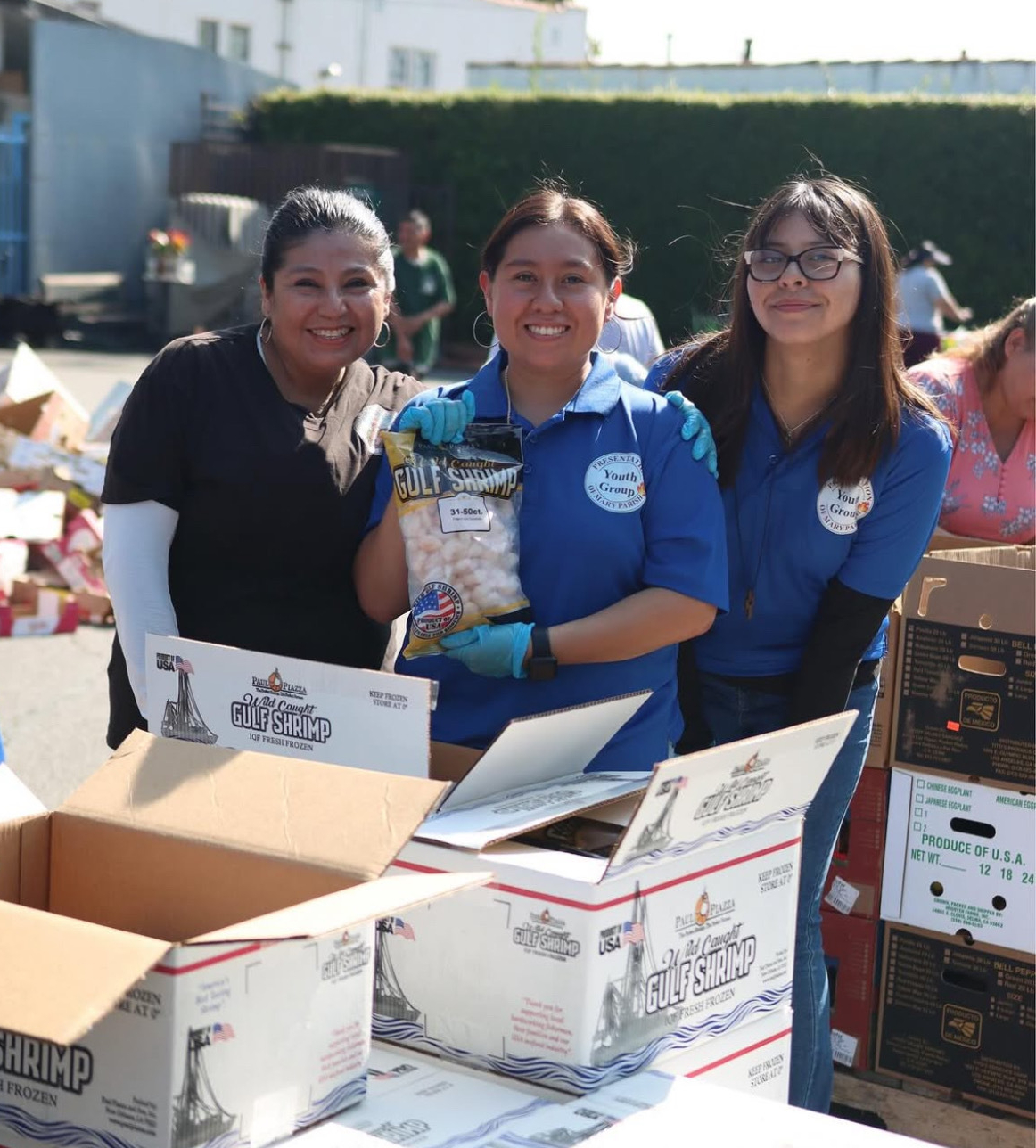
At Presentation, many of the older, more active parishioners have had to stay home because of the raids. So it fell to some 25 of the parish’s youth group members to volunteer at the church’s food bank to support families in need, including those living in fear of ICE raids.
A few weeks ago, people began to slowly stop showing up at the food bank, which raised concerns among the volunteers and pastor Father Fredy Rosales. Some adult parishioners decided to take food and drive themselves to the families’ homes.
After a few of the youth noticed Rosales’ Facebook Live video of him welcoming people to the food bank, they saw an opportunity to use other platforms like Instagram to spread the word about the initiative.
“We came to realize as a whole youth group that the adults [use] Facebook, not the younger ones,” youth group coordinator Fatima told Angelus.
The food bank has since drawn plenty of early birds.
“I get there at like seven or eight, and there’s already a huge line wrapping around the church,” said 17-year-old youth group volunteer Ximena.
Just a few blocks away from the same church, Margarita lives with her 22-year-old daughter. She stopped attending the food bank due to fear of ICE raids. “It’s been a month and a half since I stopped attending,” she said.
She told herself, “I don’t want to be unlucky enough to be on the street, waiting for food, and they [ICE] take me away.”
Because of this fear, Margarita doesn’t even go to the bus station anymore. Her daughter now takes her to doctor appointments and does the grocery shopping for her.
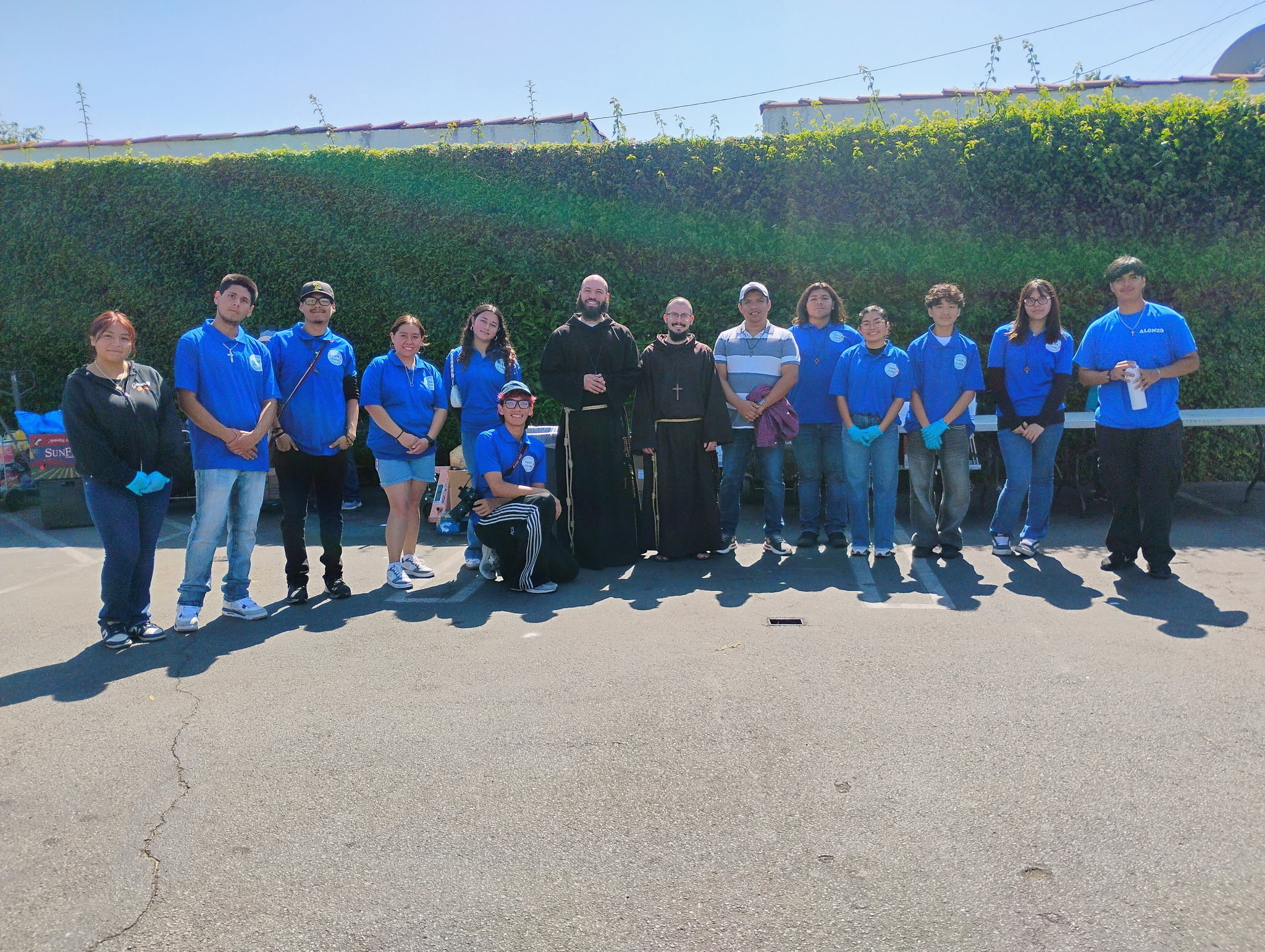
Father Stan Bosch, pastor of St. Raphael, is also a therapist with years of experience working with gang members. He sees his work as dealing with the emotional and spiritual consequences of the immigration sweeps.
“We want to make sure people are cared for and to know that we’re not going to go away,” said Bosch. “The church is a place where they can express their pain and their fear. But we’re limited because right now people are having a hard time leaving their homes.”
At Our Lady of Talpa, Father Ruiz said Mass attendance has dropped 30% since the ICE raids began, but he has implored his community to take solace in Our Lady of Guadalupe’s words: Be not afraid. He plans to add a banner at the parish’s outdoor patio with that message.
“Yes, there’s raids, yes, there’s all these things going on, but we’re in the hands of God, and our Blessed Mother is watching over us and protecting us. So be careful, but don’t be fearful.”
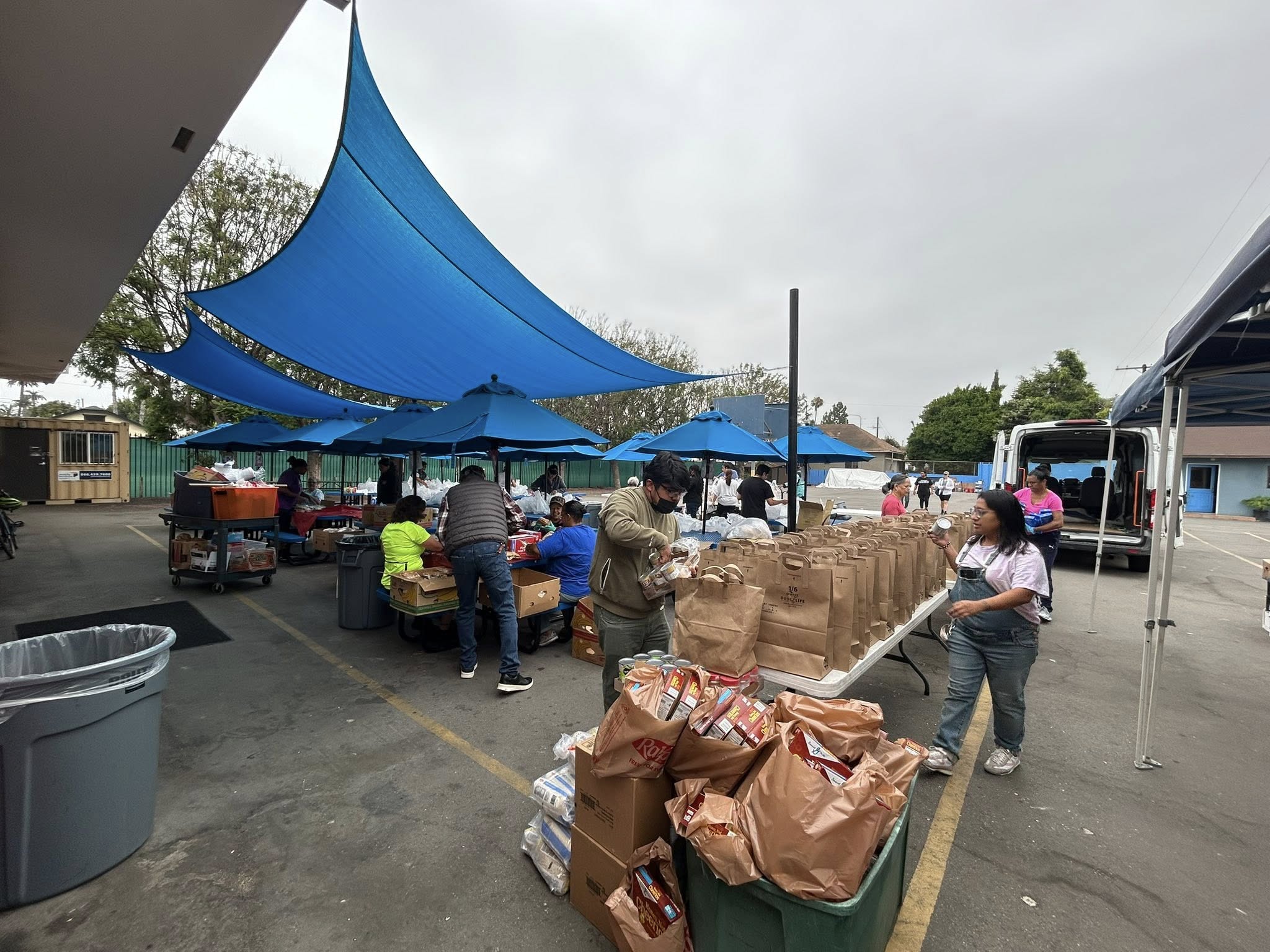
A few miles west, Irene and her husband have attended St. Patrick’s for more than a decade, and they run a marriage group with 12 married couples.
After hearing a story from one couple saying “how they planned to go to the market and be prepared” — that if an ICE raid were to occur, one of them would hide and stay with the children — Irene’s heart dropped. She knew she had to tell the priest, Dyer, and do something about it.
During the height of the ICE raids, their meetings in June were held on Zoom for three consecutive weeks. As the raids slowed down, they returned to meeting in person.
But Irene’s marriage group has had ongoing conversations about “how their children have had to grow up faster.” Some adult children offered to help other parents.
For St. Patrick, Dyer and his pastoral team decided to call for volunteers for a new food bank program during Sunday Masses one weekend. By the end of the third Mass, they already had 50 sign-ups.
“The mission is to create community,” said Dyer. “What kind of community? Jesus told us in the Gospel of John: ‘Love one another as I have loved you.’ ”
As of writing, the parish had identified some 100 families in need.
“Christ is in this community around us,” Dyer tells his parishioners. “The people here, according to Jesus, are meant to be as important to you as your blood family.”
While what comes next is uncertain, parishes in the archdiocese are meeting the moment, Cuevas said, with a hope that something good comes from the pain that has been caused.
“I think that there’s an opportunity on the other end of all of this, which is what Archbishop Gomez has said from the beginning, We need to have a very different conversation about immigration and focus on change, focus on an actual path toward comprehensive reform in a manner that helps our communities and not hurts them.
“My hope is that all of this is for a reason, that we're going through all of this because it’s forcing us to think about the topic a little differently and approach it from a point of compassion.”
Editor-in-Chief Pablo Kay contributed to this story.
